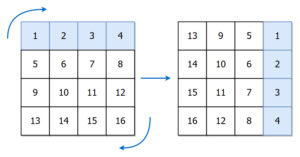Difficulty level – Easy
Intersection of two sorted arrays
Problem statement – Given two sorted arrays, find the intersection (elements present in both arrays).
- Solution must be O(M + N) in time and O(min(M, N)) space.
- Can you apply merge sort’s merging logic here?
Element in an array which appears once while other appear twice
Problem statement – Given an array of numbers where all numbers appear twice except for one number which appears only once, find that number.
- Solution should be O(N) in time and O(1) in space.
- Use bit operations.
Kth smallest element in an array
Problem statement – Given an unsorted array of N elements, find the kth smallest element. kth smallest element is the element at index k if the array were sorted.
- Solution should be O(N) in time and O(1) in space.
- Can you think of a divide-and-conquer based solution?
- Can you apply Quicksort’s partitioning logic here?
Add one to digit array
Problem statement – Given a non-negative integer in the form of an array of digits, add one to digit array. The digits are stored such that the most significant digit is at the head of the list.
- Example, A = {1, 3, 5}, answer = {1, 3, 6}
Find pivot element in a sorted and rotated array
Problem statement – Suppose we have a sorted array, and now we rotate it N times, find the pivot element. The pivot element would be the largest element. Also, can you calculate N?
- Solution should be O(log N) in time and O(1) in space.
- Can you think of a binary search based solution where you keep comparing the middle element with the last element?
Difficulty level – Medium
Find the majority element in an array
Problem statement – Given an unsorted array, find the majority element (element which occurs for more than N/2 times).
- Solution must be O(N) in time and O(1) in space.
- If the majority element exists, there will only be one such element. How can we find it?
Maximum sum contiguous sub-array
Problem statement – Given an array, find a contiguous sub-array whose sum is maximum. More precisely, if we have an array A[0, 1, 2 … N], we need to find a sub-array A[i, i + 1, i + 2, … j] such that the sum of elements in the sub-array is maximum.
- Your solution should be O(N) in time and O(1) in space.
- Can you think of a solution which solves the problem in a single scan of the array?
Print matrix in spiral order
Problem statement – Given a 2D array (or matrix) of N rows and M columns, print it in a spiral order. Example, for the below matrix –
int[] arr = {
{1, 2, 3},
{4, 5, 6},
{7, 8, 9},
};
The output is –
1 2 3 6 9 8 7 4 5View Solution
Rotate matrix clockwise
Problem statement – Given an array of N rows and N columns (square matrix), rotate the matrix by 90° in clockwise direction.

View Solution
First missing integer in an unsorted array
Problem statement – Given an unsorted integer array, find the first missing positive integer. Example,
- If A = [-1, 4, 2, 3, 5], missing integer = 1.
- If A = [1, 5, 2, 3, 4, 7], missing integer = 6.
- If A = [-1, -2, -3, -4], missing integer = 1.
- Your solution should be O(N) in time and O(1) in space.
- Can you make changes in the array such that you can mark which numbers in 1 to N are already present in the array?
